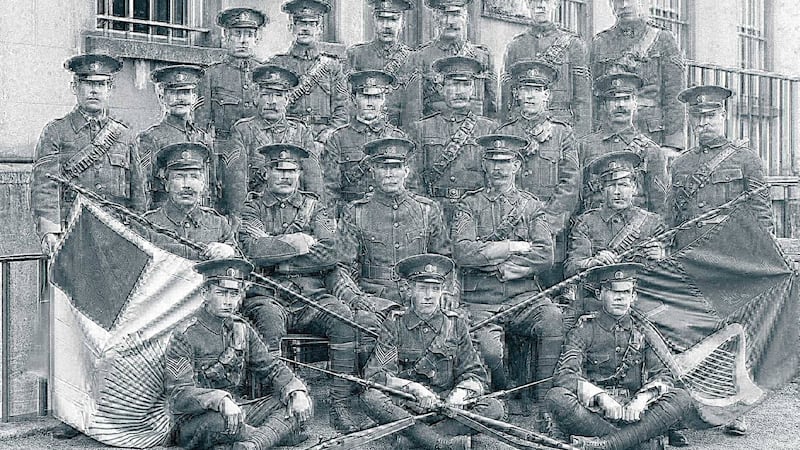A conference in Belfast this week looked at how we will commemorate 1916 in Ireland in two years' time. In this article guest speaker Ronan Fanning outlines how the First World War was the cause of the British government reacting so ineptly to the Easter Rising
IRELAND had been the touchstone of British party politics, the most important single issue distinguishing Liberals from Conservatives, ever since Gladstone had embraced Home Rule and this was never more true than in 1914 when the Ulster crisis over the third home rule bill had brought Britain to the brink of civil war.
The Great War changed all that. Henceforth the British political parties, united in pursuit of the supreme national interest of victory over Germany, shunned what divided them and embraced what united them. Bipartisanship was no longer a matter of choice but of necessity. This powerful impetus towards consensus made imperative the immediate resolutions of party-political differences on Ireland which had previously seemed intractable.
What was the compromise that put Ireland on ice for the duration of the Great War?
John Redmond, the leader of the Irish Parliamentary Party, fatefully, agreed to the suspension of Home Rule; the prime minister, Henry Asquith, agreed to the suspension of partition.
The Irish Parliamentary Party lost more than it gained from a formula which deprived it of its raison d'etre. Forty years after its foundation as a separate party, its members appeared to have achieved their goal and yet they had nothing to show for it: no parliament to set up in Dublin, no offices to fill, no patronage to dispense, no panoply of power to cover their impotence in the vortex of a war that sucked up all political energy for four long years.
The erosion of John Redmond's power at Westminster and, consequently, in Ireland, became quickly apparent. The wartime spirit of co-operation between Liberals and Conservatives made meaningless the Irish Parliamentary Party's control of the balance of power in the House of Commons. This became explicit on 25 May 1915 when bipartisan politics found full expression in the formation of the first coalition government.
It was precisely because of the understandably obsessive concern with the war effort that the Great War conferred as many advantages upon the forces of Irish revolutionary nationalism as it did disadvantages upon the Irish Parliamentary Party. 'England's difficulty is Ireland's opportunity' is so well-worn a slogan of Irish separatists that it is too easily forgotten how long it had been since international difficulty had created such an opportunity.
Not since the battle of Waterloo had Britain been drawn into a major war involving all the Great Powers. The 120 years of the Act of Union were, for the most part, a period of unparalleled tranquillity in the history of Britain's relations with the European continent.
It is no coincidence that, just as one great European war played a decisive part in making the Act of Union, the next great European war played a decisive part in breaking it.
The prime minister spent the Easter weekend of 1916 at his country home, resting from the responsibilities of running the war and preparing for a crucial Commons debate on the introduction of compulsory military service.
He drove back to Downing Street late on Easter Monday and arrived just after midnight. Only then did he learn of the rebellion that had erupted in Dublin earlier that day. Asquith "merely said 'well, that's something' and went off to bed". Thus did the Irish question emerge from the oblivion to which it had been consigned in September 1914.
Asquith's languid indifference sums up the impact of the Great War on Britain's Irish policy. Ireland, which in 1912-14 held the centre of the political stage, had, by Easter 1916, been driven into the wings, if not out of the theatre.
Home Rule, first postponed at the outbreak of war, was postponed again after the collapse of Lloyd George's 1916 negotiations with John Redmond and Edward Carson about the immediate implementation of home rule: the crux, as always, was Ulster.
Would its exclusion be temporary or permanent?
The outcome, which made public Redmond's readiness to accept partition if only on a temporary basis, had a predictably disastrous impact on the popularity of Ireland's beleaguered constitutional nationalists.
The crisis in the spring of 1918 precipitated by the proposal, albeit aborted, to apply compulsory military service to Ireland set the seal on this process.
The conscription crisis of 1918 epitomises the impact of the Great War on Britain's Irish policy.
It provides the classic example of how that policy wobbled and wavered with the ebb and flow of war, of how it was totally indifferent to how it benefitted Sinn Fein and disadvantaged Ireland's constitutional nationalists, of how it was shaped by the need to nurture Anglo-American relations - the American
entry into the war in 1917 was the moment when the so-called 'special relationship' became what it has ever since remained: the central plank in British foreign policy - rather than by any intrinsic concern for harmony in Anglo-Irish relations.
Although conscription was never introduced in Ireland, the mere threat of its introduction infuriated all Irish nationalists. The crisis devastated what remained of the Irish Parliamentary Party's credibility, partly because Sinn Fein had blazed the anti-conscription trail and abandoning Westminster was seen as jumping on the Sinn Fein bandwagon.
It was the war that put Home Rule on ice; it was the war that restored the Unionists to office; it was the war that demanded the executions after the Easter rebellion and that then, and again in 1918, dictated internment without trial, thus empowering Sinn Fein and the Irish Volunteers while destroying the Irish Parliamentary Party.
It was the Great War that conceived, brought forth and nourished the 'terrible beauty' of Yeats's Easter 1916.
* Ronan Fanning, professor emeritus of Modern History at University College Dublin, was guest speaker at the conference Remembering 1916 - The Challenges for Today held in Belfast by the Community Relations Council and the Heritage Lottery Fund. His latest book, Fatal Path: British Government and Irish Revolution 1910-1922 was shortlisted for the 2013 Irish Book Awards.


